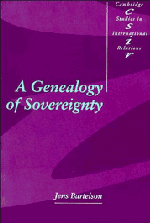Book contents
- Frontmatter
- Contents
- Preface
- 1 Introduction: sovereignty and fire
- 2 The problem: deconstructing sovereignty
- 3 Beyond subject and structure: towards a genealogy of sovereignty
- 4 Inventing outsides: proto-sovereignty, exempla and the general theory of the state in the Renaissance
- 5 How policy became foreign: sovereignty, mathesis and interest in the Classical Age
- 6 Reorganizing reality: sovereignty, modernity and the international
- 7 Conclusion: the end of sovereignty?
- Notes
- Bibliography
- Index
- CAMBRIDGE STUDIES IN INTERNATIONAL RELATIONS
3 - Beyond subject and structure: towards a genealogy of sovereignty
Published online by Cambridge University Press: 03 May 2011
- Frontmatter
- Contents
- Preface
- 1 Introduction: sovereignty and fire
- 2 The problem: deconstructing sovereignty
- 3 Beyond subject and structure: towards a genealogy of sovereignty
- 4 Inventing outsides: proto-sovereignty, exempla and the general theory of the state in the Renaissance
- 5 How policy became foreign: sovereignty, mathesis and interest in the Classical Age
- 6 Reorganizing reality: sovereignty, modernity and the international
- 7 Conclusion: the end of sovereignty?
- Notes
- Bibliography
- Index
- CAMBRIDGE STUDIES IN INTERNATIONAL RELATIONS
Summary
[A]s long as we continue to contrast history directly with structure, we persist in believing that the subject can gather, build up and unify matter. But this no longer holds true if we think of ‘epochs’ or historical formations as multiplicities. The latter escape from both the reign of the subject and the empire of structure.
Deleuze, FoucaultThe previous chapter started out from a Nietzschean observation: only that which has no history can be defined. But how can we write a history of that which cannot be defined, lacks stable meaning and reference, and which does not exist except by being known, and then within a knowledge which presupposes the sovereignty of the knowing subject?
As I shall argue in this chapter, to write a history of sovereignty is to write a political history of the knowledges that makes sovereignty intelligible, a history of the unthought parts of our political understanding. Strictly speaking, the object of study is therefore held in suspense; as with histories of other central and ambiguous concepts, a history of sovereignty must be a history without fixed referent, since it is precisely a history of this referent and its formation in time.
- Type
- Chapter
- Information
- A Genealogy of Sovereignty , pp. 53 - 87Publisher: Cambridge University PressPrint publication year: 1995



